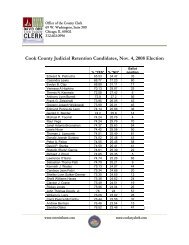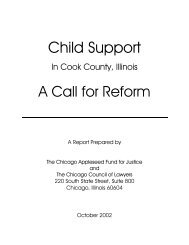Videoconferencing in Removal Hearings: A Case Study of the ...
Videoconferencing in Removal Hearings: A Case Study of the ...
Videoconferencing in Removal Hearings: A Case Study of the ...
You also want an ePaper? Increase the reach of your titles
YUMPU automatically turns print PDFs into web optimized ePapers that Google loves.
are not subject to videoconferenc<strong>in</strong>g. The literature that criticizes videoconferenc<strong>in</strong>g for<br />
marg<strong>in</strong>aliz<strong>in</strong>g already disempowered groups seems especially apposite <strong>in</strong> this context.<br />
Credibility, moreover, is <strong>of</strong>ten central to an immigrant’s case and for this reason<br />
alone, courts should refra<strong>in</strong> from us<strong>in</strong>g videoconferenc<strong>in</strong>g at any hear<strong>in</strong>g where an<br />
Immigration Judge reaches a decision on <strong>the</strong> merits. Lastly, our f<strong>in</strong>d<strong>in</strong>g <strong>of</strong><br />
disproportionate removal <strong>of</strong> non-English speak<strong>in</strong>g and Lat<strong>in</strong>o immigrants <strong>in</strong> Master<br />
Calendar hear<strong>in</strong>gs is troubl<strong>in</strong>g and merits a study conducted <strong>in</strong> accordance with scientific<br />
pr<strong>in</strong>ciples. In a context where credibility is central and communication is at a premium,<br />
and where <strong>the</strong> subjects are <strong>of</strong>ten non-English speak<strong>in</strong>g m<strong>in</strong>orities, it seems imprudent to<br />
<strong>in</strong>troduce new technologies that appear to underm<strong>in</strong>e <strong>the</strong> fairness <strong>of</strong> <strong>the</strong> court process.<br />
Recommendations:<br />
• EOIR should issue regulations barr<strong>in</strong>g <strong>the</strong> use <strong>of</strong> videoconferenc<strong>in</strong>g <strong>in</strong> merits<br />
hear<strong>in</strong>gs, except by written consent <strong>of</strong> <strong>the</strong> immigrant. In cases where an<br />
immigrant agrees to have a merits hear<strong>in</strong>g proceed via videoconferenc<strong>in</strong>g, <strong>the</strong><br />
court should require that <strong>the</strong> immigrant be told by <strong>the</strong> court <strong>of</strong> his/her right to an<br />
<strong>in</strong>-person hear<strong>in</strong>g and sign a written waiver expla<strong>in</strong><strong>in</strong>g his/her right to an <strong>in</strong>-<br />
person hear<strong>in</strong>g.<br />
• EOIR should issue regulations allow<strong>in</strong>g immigrants to have <strong>in</strong>-person Master<br />
Calendar hear<strong>in</strong>gs for good cause. For a def<strong>in</strong>ition <strong>of</strong> “good cause,” EOIR should<br />
look to <strong>the</strong> one adopted by <strong>the</strong> Social Security Adm<strong>in</strong>istration for <strong>the</strong> purpose <strong>of</strong><br />
opt<strong>in</strong>g out <strong>of</strong> Social Security videoconference hear<strong>in</strong>gs. 73<br />
73 See 20 C.F.R. § 404.936(e) (2005). The Social Security Adm<strong>in</strong>istration regulations state that <strong>the</strong> desire<br />
for an <strong>in</strong>-person hear<strong>in</strong>g is <strong>in</strong> and <strong>of</strong> itself good cause for hold<strong>in</strong>g an <strong>in</strong>-person hear<strong>in</strong>g. See also 38 C.F.R.<br />
§ 20.700(e) (2005) (Applicants for benefits from <strong>the</strong> Veteran’s Adm<strong>in</strong>istration are permitted to appeal<br />
ei<strong>the</strong>r <strong>in</strong>-person or by videoconferenc<strong>in</strong>g, accord<strong>in</strong>g to <strong>the</strong>ir preference).<br />
53




